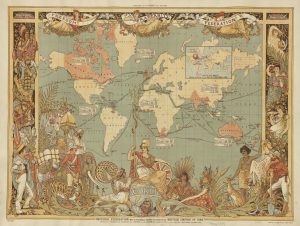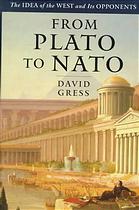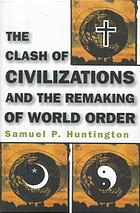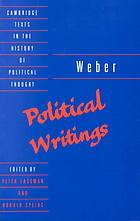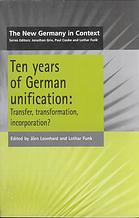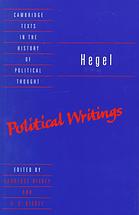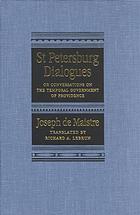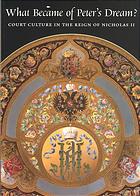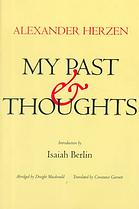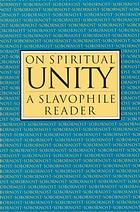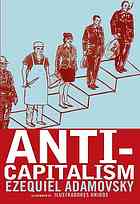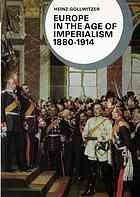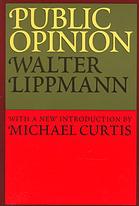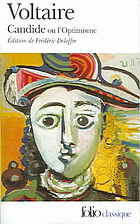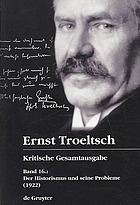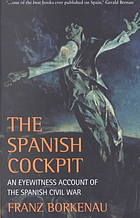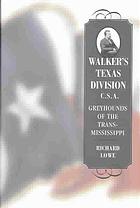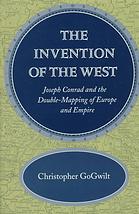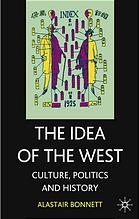Imperial Federation, map of the world showing the extent of the British Empire in 1886 / Creative Commons
By Dr. Riccardo Bavaj
Professor of History
University of St. Andrews
This article explores the transformation of the directional concept “the west” into the socio-political concept “the West”. From the early 19th century onward, the concept of the West became temporalized and politicized. It became a concept of the future (“Zukunftsbegriff”), acquired a polemical thrust through the polarized opposition to antonyms such as “Russia”, “the East”, and “the Orient”, and was deployed as a tool for forging national identities. The gestation of “the West” went hand-in-hand with the gradual substitution of an east-west divide for the north-south divide that had dominated European mental maps for centuries.
Introduction
From Plato to Nato, David Gress
“From Plato to NATO”: the ironic title of David Gress’ (*1953) voluminous study on the idea of the West has become common parlance among historians. Gress’ starting point is the sweeping surveys on the history of “Western Civilization” which have been taught in the United States for almost a century. In its heyday between the 1920s and the 1950s, the “Western Civilization” curricula took students on an intellectual journey that began in ancient Greece and culminated in present-day America, meandering quite literally from Plato to NATO. The “Western Civilization” narrative became an integral part of the “liberal consensus” which crystallized in the 1940s, providing American citizens with a sense of who they were, and legitimizing America’s position as the spearhead of “Western progress”. Keen to tell the “true” story of “the West”, Gress is anxious to point out the errors of the “Western Civilization” advocates and of some of their opponents. Roman, Christian and Germanic institutions, he argues, featured more prominently in “Western history” than the classic Ivy League curricula allowed. Largely conceived in the aftermath of the First World War, these curricula had no time for the freedom-loving Teutonic warrior. Contrary to what the title of his book suggests, however, Gress’ study does not offer an account of “the idea of the West”. Apt as his reckoning with the “Western Civilization” narrative may seem, his main interest does not lie in disentangling the threads of the discursive networks that constituted “the West” conceptually. While he takes pains to deconstruct the master narrative of the “Western Civilization” saga, he offers a counter-narrative that is no less essentialist.1
Germany: The Long Road West, 1789-1933, Heinrich August / The Clash of Civilizations and the Remaking of World Order, Samuel P. Huntington
The latest attempt to construct a narrative of “the West” was undertaken by Heinrich August Winkler (*1938) . His History of the West is the first of its kind in German, but once translated, it will be part of a cottage industry which has liberally supplied the English-speaking book market with histories of the West for almost a century. Though aware of the semantic multiplicity of the term, Winkler’s “discourse history” leaves the discursive web that produced this multiplicity largely unexplored.2 Both Gress’ and Winkler’s books appeared as people were starting to question the existence of “the West”, disregarding Samuel P. Huntington’s (1927–2008) theory of a Clash of Civilizations.3 First, the end of the Cold War seemed to remove the rationale for a socio-political entity that, during the time of the Iron Curtain, was primarily defined in opposition to a Communist “East”. Second, even if Islamic terrorism may provide a new alterity sufficiently prominent to keep “the West” alive (paradoxical as this may sound), political differences over the Iraq War have sparked discussions on a hiatus within the “Atlantic Community”, an unbridgeable gap between the European Continent on the one side, and, on the other, what some commentators call “the Anglosphere”. Two “Wests”, it has been argued, are one too many, and may indicate that none exists at all. Not for the first time, “the West” is in decline. Or so it seems.4
A Study of History, Arnold J. Toynbee / Political Writings, Max Weber
People have been talking about a decline of “the West” for more than a century.5 Oswald Spengler (1880–1936) and Arnold Toynbee (1889–1975) are only the most prominent examples.6 Many others have been debating its “crisis”, pondering its chances of “survival”, and considering its “suicide”.7 Max Weber (1864–1920) famously explored the ambiguities of “Occidental rationalization”.8 Some critics have been condemning “the West’s” civilizational achievements in an outright fashion, subjecting “Western values” to fierce criticism, or lamenting “the West’s” inability to live up to its own standards. At the same time, “the West” has been praised for its relentless dynamic, its never-ending creativity, and its startling vitality.9 The West is dead, long live the West. It is the discursive continuities and conceptual manifestations of “the West” that need to be investigated if historians are to come to grips with the idea of the West.
Approaching the West Conceptually
Scholars have begun to examine the concept of the West only very recently. A handful of studies have shed light on the conceptual origins and shifting meanings of “the West”,10 but historians are still in the dark about many facets of its discursive construction. While the literature on “Western Civilization” and “Occidentalism” is substantial, in-depth analyses of the concept of the West are rare. The Geschichtliche Grundbegriffe, generally thin on spatial concepts, have nothing to offer on “the West”, and there are no detailed investigations of relevant semantic transfers that cut across national boundaries. Considering these lacunae in historical scholarship, this article is bound to offer hypotheses instead of firm conclusions. Its general approach is to trace the evolution of “the West” through an analysis of the communicative contexts, the semantic fields, and the discursive networks in which various deployments of the concept were embedded. The aspect of visual representations of “the West” through maps, images and other means of “naturalization” will not be addressed, though it certainly makes for a promising subject of future research.11
Ten Years of German Unification: Transfer, Transformation, Incorporation?, Jörn Leonhard
Informed by Reinhart Koselleck’s (1923–2006) and Jörn Leonhard’s (*1967) studies,12 this investigation is based on several assumptions on the transformation of the directional concept “the west” into the socio-political concept “the West”:13 First, historical actors start using the concept in a more general and abstract sense, referring to a group of countries, a civilization, or a way of life. The employment of the concept, which helps to register, process and articulate historical experiences, homogenizes space, reduces complexity, and creates orientation. Second, historical actors start using the concept in a dynamic sense, referring to the past, present and future of a more or less well-defined area in comparison to other parts of the world. Against the background of an increasing acceleration of time, they temporalize “the West”, render it a concept of the future (Zukunftsbegriff) and endow it with diverse horizons of expectation: notions of progress and modernity. A geographical direction becomes temporalized space, as “the West” is placed in the temporal continuum of philosophies of history, with distinct regimes of temporality attached to it. “The West”, in other words, metamorphoses into “TimeSpace”,14 the dynamic quality of which becomes most evident in neologisms such as “Westernizers” and “Westernization”.
Third, historical actors start using the concept in a political sense, referring to notions of reason, liberty, democracy, constitutional government, the rule of law, the middle class, private property, individuality, and so on. They employ the concept as an effective tool in political debates, use it to advance political agendas, and fight over its “correct” meaning. Political languages become spatialized, and previously universal concepts become enclosed in a confined space called “the West”. This space, however, may not necessarily be conceived as hermetically closed; “Western democracy”, for instance, may still refer in a Hegelian fashion to a state of universal progress attainable in principle by every part of the world. At any rate, “the West” and its cognates acquire a decisive polemical thrust and a clear ideological edge through the polarized opposition to distinct antonyms such as “Eastern barbarism”, “Oriental despotism “, or the “Asiatic mode of production”. “The West” becomes a weapon deployed to mobilize people, a rallying cry that wields affective power and is used to forge national identities.
Looking to the East
Political Writings / Georg Wilhelm Friedrich Hegel
To trace the origins and the evolution of “the West” in 19th century Europe, one is bound to look to the east. Russia emerged as the antonym that gave birth to “the West”. First, it became the location of intense debates on “the West” and “Westernization”. Second, seen through the eyes of French, German, and British observers, it became a foil for contrasting notions of “the West” that were articulated in what came to be known as Western Europe. That “Western Europeans” located Russia in the east, however, did not become common until the 1830s and 1840s. Georg Wilhelm Friedrich Hegel’s (1770–1831) lectures on the philosophy of history, given in the 1820s,15 as well as Dominique Dufour de Pradt’s (1759–1837) study on international relations from 182216 provide an early indication that French and German scholars were starting to substitute an east-west divide for the north-south divide that had dominated European mental maps for centuries. Philipp Jakob Siebenpfeiffer’s (1789–1845) journal Der Bote aus Westen (Messenger from the West), or Westbote (1831–1832), moreover, offers an early example of the temporalization and politicization of the east-west divide. While Russia had long been considered a northern power, it gradually transformed into an eastern one. Though this geographical imagination rarely entered Russian self-conceptions, which typically externalized the east as the Orient,17 “Western Europeans” framed Russia increasingly as the epitome of “Eastern Europe“. This geographical shift, however, happened later than the second half of the eighteenth century as has been claimed by Larry Wolff (*1957) .18 Marred by methodological inaccuracies, Wolff’s widely-read study fails to qualify the findings in Hans Lemberg’s (1933–2009) seminal essay on the conceptual history of “Eastern Europe” – a source of wisdom sadly neglected in English-language scholarship. Lemberg partly attributes the re-mapping of Europe to the contemporaneous production of knowledge on Slavic and “Nordic-Germanic” language communities, a process that went hand-in-hand with the gestation of “the West”.19
In Russia, debates on “the West” served an overarching purpose: the negotiation of Russian identity. In the light of experiences with the authoritarian regime of Nicholas I (1796–1855) and his crushing of the Decembrists’ uprising from 1825, Petr Chaadaev (1794–1856) expressed his bitterness over the “immense calamity” of the thwarted revolt that was “setting us back half a century”. A veteran officer of the Napoleonic Wars and influenced by French Catholic philosophers such as Joseph de Maistre (1753–1821) and Louis-Gabriel-Ambroise de Bonald (1754–1840) , he castigated Russian society for resisting “all real progress”. In his First Philosophical Letter, written in French in 1829, he declared that Russians, who were “neither of the West nor of the East”, but condemned by the Great Schism to Byzantine stagnation, lived in a “narrow present”, with no history, tradition, or identity. They were “placed, as it were, outside of time” – untouched by the ideas of “justice, right, and order” which their “Western brethren” had brought to fruition.20
What Became of Peter’s Dream? Court Culture in the Reign of Nicholas II / Anne C. Odom
Chaadaev used the concept of the West to revisit and re-evaluate the legacy of Peter the Great’s (1672–1725) far-reaching reforms, which had been implemented in the previous century. To make sense of these reforms, initially framed as measures to “Europeanize” Russia, Chaadaev deployed the concept of the West to escape the geographical ambiguity of the term “Europe”. After all, Russia had largely been acknowledged as a European power in the course of the 18th century, a status certainly confirmed by the experience of the Napoleonic Wars.21 In the wake of the publication of Chaadaev’s letter in 1836, which caused a stir among Russia’s elites and sparked a debate on the nation’s past and future, the concepts of Europe and the West were frequently used interchangeably, the latter serving the purpose of divesting the former of its “Russian facets” and narrowing down its multi-layered meanings.
My Past & Thoughts, Alexander Herzen / On Spiritual Unity: A Slavophile Reader, Ivan Vasilevich Kireevskii
Chaadaev’s letter prompted the formation of a political camp that pitted the Russian institution of the village commune (obshchina) and what it took to be the Orthodox idea of a harmonious spiritual community (sobornost’ ) against a “Western” way of life which it dismissed as artificial, soulless, and divisive. This camp, which soon adopted the name “Slavophiles”, coined the term “Westernizers” (zapadniki) as a derogatory expression used to discredit Chaadaev’s “heretical” standpoints as well as the political views of other proponents of a “Westernized” Russia like Vissarion Belinsky (1811–1848) , who was an ardent believer in the “achievements of civilization, enlightenment, and humanitarianism”.22 Aleksandr Herzen (1812–1870) , in the eyes of Slavophiles a “man of the West”, but for some Westernizers a “man of the East”,23 was at first also drawn to the democratic ideas that had been circulating in France during the first half of the 19th century, but was disappointed by the “failed” revolutions of 1848–1849 and turned into an advocate of an obshchina-based socialism. As an emigrant who lived in Paris and later in London, he was a striking example of a cross-cultural mediator between Russia and “the West”.24 His “Russian socialism” differed significantly from critiques of “Western” reason and individuality, as advanced by Slavophiles such as Ivan Kireevsky (1806–1856) , Aleksei Khomiakov (1804–1860) , and Konstantin Aksakov (1817–1860) .25
In the 1860s, the tradition of Russian Anti-Westernism was re-invented by Pan-Slavists like Nikolai Danilevsky (1822–1885) who propagated an aggressive Russian expansionism and constructed a clear-cut dichotomy between a Romano-Germanic Europe doomed to decline and a Slavic “historico-cultural type” destined to prevail.26 A polarized conceptualization like this left no room for any Hegelian mediation. While Hegel, who had a major impact on Russian intellectual thought, had played a decisive role in the transformation of the 18th-century notion of a universal civilization into a spectrum of various civilizations, he had still allowed for building historically dialectic bridges between a civilization-in-the-singular and a civilization-in-the-plural. Pan-Slavism severed any intellectual ties that might have related different civilizations.
The anti-Western attacks that were launched by Pan-Slavists, whether in Danilevsky’s irreconcilable fashion or in slightly mitigated ways as in Fyodor Dostoyevsky’s (1821–1881) writings,27 were, of course, not solely debated within the confines of Russian borders. They also reached audiences in “the West” itself. The exact channels through which Russian concepts of the West travelled westwards still need to be investigated further,28 but it may be argued that “Western European” Russophobia, a major constituting factor in the crystallization of “the West” from the 1820s onward, was reinforced by both Russian anti-Westernism and the criticism advanced by Russian “Westernizers”. Jules Michelet (1798–1874) , for instance, referred approvingly to Chaadaev’s Philosophical Letter in 1851.29 Inspired by Herzen, however, Michelet for a time also stylized Russia as the future “interpreter between Europe and Asia“: An “Oriental revolution” would give birth to a genuine Russia that was diametrically opposed to the “Western society” Michelet sought to transcend.30
Anti-Capitalism, Ezequiel Adamovsky
Yet, as Ezequiel Adamovsky (*1971) has shown in his study on images of Russia in 19th century France, the tsardom was generally constructed as a “land of absence” that starkly contrasted with the civilizational achievements of “the West”. It was depicted as a deficient historical entity, often perceived through the prism of discursive traditions ascribed to Asia and the Orient, which, after all, was the traditional signifié of “the East”.31 Astolphe-Louis-Léonor Marquis de Custine’s (1790–1857) Chaadaev-inspired travelogue from 1843 is a case in point,32 as is a review by the liberal politician and writer Saint-Marc Girardin (1801–1873) . In 1835 he contrasted Russia with the “liberal spirit” of a “West” that consisted of “English commerce and French liberty” – an instructive example of the multi-layered spatialization of political discourse.33 In 1846, moreover, Louis de Juvigny, haunted by the spectre of an expansionist Russia, invoked the historical unity of “Western civilization” that was separated from “Russian civilization” through “an abyss … which rivers of blood would scarcely fill”.34 Such a view was echoed by the writer and critic Saint-René Taillandier (1817–1879) , who, against the background of the Crimean War , constructed an opposition that was not only imbued by images of the Orient, but was also reminiscent of Leopold von Ranke’s (1795–1886) notion of a unity of the Romano-Germanic peoples: a mysterious “Oriental” Russia on the one side, and, on the other, Western Europe’s “Germanic-Roman society”, a “Christian”, “liberal”, and “modern civilization”.35
Ten years later, in 1864, the politician Charles Kolb-Bernard addressed the Corps législatif on the Polish question. In the light of the recent uprising he pitted “Western civilization”, “freedom”, and “individual property” – a semantic field that included Poland – against a Russian “Orient” that he viewed as “despotic, theocratic and communist”. In the following year Hyppolite Carnot deployed the same dichotomy to hail the principles of the “great Western family”.36 However, the function of the Orientalization of Russia, and of the corresponding homogenization of “Western society”, certainly varied between different communicative contexts. The liberal Taillandier, for instance, employed the concept to exoticize socialist ideas by way of linking them to the “Russian spirit” of “Oriental despotism”.37
Liberals in the Prussian Rhine Province, though, barely availed themselves of the concept as a prominent tool in political debates, even if, between the revolutions of 1830 and 1848/1849, they did temporalize the newly-emerging east-west divide in terms of a backward East and a “civilized West”. That they rarely donned the vestments of avowed Westerners reflected their ambiguous self-positioning in Europe’s “centre”, between a French West and a Russian East. The Russophobia of Rhenish liberals was much more significant than their reservations about their western neighbour. Indeed, it was their imagination of Russia that allowed them to solve their perplexing double-bind situation: namely, to feel attached to the “liberal ideas” of France, but to belong to a state which they felt was politically backward. The comparison with the Russian “barbarians in the East” was meant to throw into relief the fundamental embeddedness of Rhenish liberals in “civilized Europe”.38 Still, it was “Europe” and not “the West” with which they identified. Ultimately, they fit in with the multifaceted German continuity of a European middle position, which has been extensively researched and need not be rehearsed here.39
Europe in the Age of Imperialism, 1880-1914 / Heinz Gollwitzer
The limited space available does not allow for a fuller examination of German images of “the West” in the 19th century.40 Readers will find valuable information on German perspectives on the relationship between “Russia”, “Europe”, and “the West” in the groundbreaking studies by Heinz Gollwitzer (1917–1999) and Dieter Groh (*1932) , which were published decades ago – in Groh’s case with the express intention of tracing the genesis of the East-West divide so prevalent during the Cold War.41 The studies show that German writers, scholars, and politicians used the concept of the West to make sense of historical experiences such as the Polish uprising of 1830 , the European revolutions of 1848/1849, and the protracted developments of the “Eastern Question”. The Crimean War in particular reinforced tropes of “the East” and helped to homogenize spaces of international relations. As may be inferred from Karl Marx’s (1818–1883) journalistic commentaries on the Crimean War, the concept of “Western powers” became common parlance at that time.42 Still, the combination of Francophobia and Anglophilia , accompanied by a lack of interest in the United States, often prevented Germans of certain political leanings from deploying the concept of the West at all in the 19th century.43
Looking to the West
More familiar than the evolution of “the West” in the 19th century – and hence treated more cursorily here – is the prominence to which it rose in the 20th. The First World War provided the catalyst for new conceptualizations of “the West”, in which the United States of America, the rising star on the horizon of political and economic progress, featured particularly prominently. This was fostered both by new developments in American policy and by the breath-taking advance in communication technologies and transportation techniques that practically shrank the Atlantic – a phenomenon famously described as “time-space compression”.44 The concept of the “Atlantic community” was created, which transformed the northern Atlantic into an “inland sea” and “ocean of freedom”, endowing the older dichotomy between Western “sea powers” and the Russian “land power” with new meanings.45 Not only in the eyes of Life magazine editor Henry Luce (1898–1967) , the United States became the self-declared “sanctuary” and “inheritor of all the great principles of Western Civilization”.46
It required, however, two world wars and the propagandistic effort of several journalists, scholars and politicians for this spatio-political re-imagination of the U.S. to take root. Only reluctantly did the American exceptionalist notion as the self-sufficient “city on a hill”, enjoying “free security” through the great divide of the Atlantic, give way to anti-isolationist ideas of an American embeddedness in the imagined community of “the West”. The discursive traditions of continentalism and “hemispherism”, most prominently anchored in the Monroe Doctrine of 1823, were firmly entrenched in U.S. political culture. Attempts to re-locate the United States on the mental maps of Americans, moreover, were far from unanimous. Atlanticist re-conceptualizations of the U.S. were not only confronted with de-spatialized notions of a global universalism but also differed among each other in both texture and rationale, depending on whether they stemmed from, say, catholic conservatives or enlightened liberals.47
Public Opinion / Walter Lippmann
Walter Lippmann (1889–1974) , for example, co-editor of the progressive magazine The New Republic and creator of the term “Atlantic community”, made the case for an American intervention in both world wars on the grounds of an enlightened “Western civilization” that included Germany but excluded Russia, at the same time highlighting the strategic necessity of securing the “safety of the Atlantic highway”.48 In the late 1930s and early 1940s, the journalist Clarence K. Streit (1896–1986) even went as far as proposing a political, economic and military union of all democracies of the North Atlantic area. He suggested the foundation of a “great republic” (Voltaire) for the sake of individual freedom, which would span the Atlantic Ocean and feed on the common “Western” heritage of the English, American and French revolutions.49 Twenty years later, the latter two upheavals would be bracketed together as “the revolution of Western civilization” in R. R. Palmer’s (1909–2002) famous account of the 18th century as the Age of the Democratic Revolution.50
Slightly different notions of a “Western” Atlantic community were evoked by catholic conservatives such as the historians Carlton J. H. Hayes (1882–1964) and Ross Hoffman (*1902) . While it was common to see the “Judeo-Christian heritage” as an integral part of “Western civilization”, the “tradition of Christendom” featured unusually prominently in their writings on the Atlantic community. For instance, they perceived the totalitarian challenge of the 1930s and early 1940s not only as a “revolt against the whole historic civilization of the West” in general but as a revolt “against the whole vast cultural heritage of the Christian Church” in particular, which had been facilitated, moreover, by the French and the Industrial Revolution and “the rise of liberalism with its atomizing of society”.51 The “prime need of twentieth-century western man”, Hoffman insisted, was to “recover and conserve” the tie with “the old world of the past”, to “take hold again upon the truths of experience enshrined in the tradition of Christendom”.52 In his eyes, Voltaire’s (1694–1778) “great republic” that had come to span the Atlantic was to be a “Christian republic”.53 Generally, however, American exponents of the idea of an “Atlantic community” broadly agreed in their rejection of both isolationist nationalism and borderless universalism and in their fight for the formation of a regional security system that would serve as a “mighty citadel of safety for the nations of the West”. Discarding both Pan-Americanism and Pan-Europeanism , they perceived the American frontier as a frontier of “historic European civilization” and “culture” – terms used interchangeably with “Western civilization”.54
Ernst Troeltsch: His Life and Work / Hans-Georg Drescher
In post-1914 Germany, however, where the “ideas of 1914” were pitted against the “ideas of 1789”, intellectual and political elites constructed a clear-cut opposition between “German culture” and “Western civilization”, which fed into notions of a German special path (Sonderweg) and became a powerful tool in shaping national identities.55 Writers like Thomas Mann (1875–1955) praised German inwardness (Innerlichkeit) as opposed to the alleged shallowness of “Western” rationalism.56 With the breakdown of Russian tsardom and the American entry in the war in 1917, moreover, “Western democracy” not only became the Allied rallying cry but also the “un-German” Other for Imperial Germany, defining a decisive fault line for decades to come.57 In the interwar period, it was left to liberal Westernizers like Ernst Troeltsch (1865–1923) to counter this effective rhetorical weapon. In his famous talk on The Ideas of Natural Law and Humanity in World Politics, held in 1922, he made a case for a rapprochement between “German political-historical-moralist thought” and the “West European-American” kind.58 After the Second World War, Troeltsch’s liberal mission was continued by scholars such as Ernst Fraenkel (1898–1975) who, following the return from his American exile, went to great lengths to anchor West German political culture in the realm of pluralist democracies, increasingly using “the West” as a rhetorical tool of persuasion and trying to convince people of the historical fallacy of contrasting the “German state” with “Western democracy”.59
The Spanish Cockpit, Franz Borkenau / Walker’s Texas Division, Richard Löwenthal
Several aspects have had to be left unexplored in this article. German history alone offers many more discursive contexts worth considering:60 the construction of “Eastern” and “Western Jews” in the early 20th century,61 the concept of a “Western border region” (Westraum) that rose to dubious prominence under the Nazi regime,62 or conservative concepts of Abendland and socialist notions of Europe as a “third force” which were both invested with anti-Western meanings.63 The immediate aftermath of the Second World War in particular offers plenty of material for research, as a study on West Germany‘s incorporation into NATO illustrates, which examines the deployment of the commonplace of “Western civilization” during the political formation of the Atlantic community.64 Yet another topic worth exploring is the commitment to the “Western cause” of (returned) émigrés such as Franz Borkenau (1900–1957) and Richard Löwenthal (1908–1991) , who, in the light of a “fundamental East-West tension of the German character”, fought in the intellectual Cold War on the side of the Congress for Cultural Freedom, a transnational agency that fostered the construction and dissemination of overtly anti-Communist notions of “the West” as a strategy of empowerment, domination and securitization.65
The Invention of the West, Christopher GoGwilt / The Idea of the West: Culture, Politics and History – Alastair Bonnett
What still needs to be examined on a more global scale is the entanglement of European concepts of “the West” with notions of “Westernization” and “the Occident” discussed in non-European areas. From the mid-19th century onward, India, China, and Japan, amongst others, became the place of intense debates on national identity which were based on competing images of “the West”.66 The role of Western European Orientalists as mediators who disseminated these images at home yet remains to be explored.67 It is indeed the spatial context of colonialism and the temporal context of the late 19th and early 20th centuries, in particular, which furthered the evolution and circulation of powerful images not only of European but of “Western civilization”. In this regard it may be worthwhile to test two hypotheses recently advanced by Anglo-American scholarship on the emergence of “the West” in turn-of-the-century Britain (1880–1930): First, the literary critic Christopher GoGwilt (*1961) claims that the concept of the West eclipsed the concept of Europe as the pivotal ideological term in the register of British imperialist rhetoric through a complex re-mapping of Europe and the Empire.68 Second, the geographer Alastair Bonnett (*1964) argues that the idea of the West eclipsed the idea of “whiteness” in scholarly and political discourse because the former proved more flexible than the latter, which, race-oriented as it was, did not allow for the upholding of “a socially exclusive cultural heritage”, nor for the inclusion of “non-white nations” like Japan in the imagined community of industrially advanced countries.69 It is hoped that hypotheses such as these, which are focussed on the identification of problem-solving rhetorical innovations, will generate new answers to the Skinnerian question as to what people were doing in using the concept of the West.70
Appendix
Sources
[Anonymous]: Österreich, 26. Januar, in: Aachener Zeitung, 4 February 1845.
[Anonymous]: Preußen und sein Antheil von Polen, in: Kölnische Zeitung, 31 March 1846.
[Anonymous]: Rückblick, in: Kölnische Zeitung, 17 January 1847.
Aron, Raymond: Plaidoyer pour l’Europe décadente, Paris 1977.
Belinsky, Vissarion Grigor’evich: Letter to N.V. Gogol (15 July 1847), in: Marc Raeff (ed.): Russian Intellectual History: An Anthology: With an Introduction by Isaiah Berlin, New York 1966, pp. 253–261.
Bell, Daniel: The Cultural Contradictions of Capitalism, New York 1976 (German translation: Die Zukunft der westlichen Welt, Frankfurt am Main 1976).
Bennett, James C.: America and the West: The Emerging Anglosphere, in: Orbis (Winter 2002), pp. 111–126.
idem: The Anglosphere Challenge: Why the English-Speaking Nations Will Lead the Way in the Twenty-First Century, Lanham 2004.
Borkenau, Franz: End and Beginning: On the Generations of Cultures and the Origins of the West, ed. by Richard Löwenthal, New York 1981 (contains previously unpublished manuscripts from 1945–1957).
idem: Die Krise des Historismus: Ein deutsches Problem?, in: idem: Drei Abhandlungen zur deutschen Geschichte, Frankfurt am Main 1947, pp. 76–110.
idem: Luther: Ost oder West?, in: idem: Drei Abhandlungen zur deutschen Geschichte, Frankfurt am Main 1947, pp. 45–75.
Burnham, James: Suicide of the West: An Essay on the Meaning and Destiny of Liberalism, Washington 1985.
Chaadaev, Petr Iakovlevich: First [Philosophical] Letter (1 December 1829), in: Marc Raeff (ed.): Russian Intellectual History: An Anthology: With an Introduction by Isaiah Berlin, New York 1966, pp. 160–173, online: http://www2.unil.ch/slav/ling/textes/ChaadaevPremlettrephilo.html [26/10/2011].
Custine, Marquis Astolphe de: La Russie en 1839, Brussels 1843/1844, vol. 1–4, online: http://gallica.bnf.fr/ark:/12148/bpt6k828082/f2 [26/10/2011].
Danilewsky, N.J.: Russland und Europa: Eine Untersuchung über die kulturellen und politischen Beziehungen der slawischen zur germanisch-romanischen Welt, translated and introduced by Karl Nötzel, Osnabrück 1965 (first published 1920; Russian 1869).
Engels, Friedrich: [Der Panslawismus – Der Krieg in Schleswig-Holstein] (February 1852), in: Karl Marx / Friedrich Engels: Werke, Berlin 1960, vol. 8, pp. 53–56.
Fleischer, Manfred P. (ed.): The Decline of the West?, New York 1970.
Fraenkel, Ernst: Deutschland und die westlichen Demokratien: Deutschlands Beitrag zur Entstehung des Typus “westliche Demokratie” (1960), in: idem: Deutschland und die westlichen Demokratien, ed. by Alexander von Brünneck, 8th ed., Frankfurt am Main 1991 (first published 1964), pp. 48–67.
Girardin, Saint-Marc: Review of the Pamphlet L’Angleterre, la France, la Russie et la Turquie, in: Journal des Débats, 18 July 1835, p. 1.
Hayes, Carlton J.H.: The American Frontier – Frontier of What?, in: The American Historical Review 51 (1946), pp. 199–216 (presidential address delivered at the annual meeting of the American Historical Association in Washington on December 27, 1945).
idem: The Novelty of Totalitarianism in the History of Western Civilization, in: Proceedings of the American Philosophical Society 82 (1940), No. 1, pp. 91–102.
Hegel, Georg Wilhelm Friedrich: Lectures on the Philosophy of World History, Cambridge 1975 (German edition 1822–1830).
Herz, Martin F. (ed.): Decline of the West? George Kennan and His Critics, Washington D.C. 1978.
Hoffman, Ross: Europe and the Atlantic Community, in: Thought 20 (March 1945), No. 1, pp. 21–36.
idem: Durable Peace: A Study in American National Policy, London et al. 1944.
idem: The Great Republic: A Historical View of the International Community and the Organization of Peace, New York 1942.
idem: Tradition and Progress and Other Historical Essays in Culture, Religion, and Politics, Milwaukee 1938.
Huntington, Samuel P.: The Clash of Civilizations and the Remaking of World Order, New York 1996.
Juvigny, Louis de: De l’Unité Européenne, Paris 1846, online: http://gallica.bnf.fr/ark:/12148/bpt6k4322614/f1 [26/10/2011].
Kagan, Robert: Power and Weakness, in: Policy Review (June & July 2002), pp. 3–28.
Kjellén, Rudolf: Die Ideen von 1914: Eine weltgeschichtliche Perspektive, Leipzig 1915, online: http://www.archive.org/details/dieideenvoneine00kochgoog [26/10/2011].
Kohn, Hans (ed.): The Mind of Modern Russia: Historical and Political Thought of Russia’s Great Age, New York 1962.
idem: Is the Liberal West in Decline?, London 1957.
Kroeber, Alfred L.: Is Western Civilization Disintegrating or Reconstituting?, in: Proceedings of the American Philosophical Society 95 (1951), No. 2, pp. 100–104.
Lippmann, Walter: The Defense of the Atlantic World, in: The New Republic, 17 February 1917, also in: idem: Early Writings, introduced and annotated by Arthur Schlesinger, Jr., New York 1970, pp. 69–75.
idem: U.S. Foreign Policy: Shield of the Republic, Boston 1943.
idem: U.S. War Aims, Boston 1944.
Little, James Stanley: The Doom of Western Civilization, London 1907.
Löwenthal, Richard: Gesellschaftswandel und Kulturkrise: Zukunftsprobleme der westlichen Demokratien, Frankfurt am Main 1979.
Luce, Henry R.: The American Century, New York 1941.
Mann, Thomas: Betrachtungen eines Unpolitischen: Mit einem Vorwort von Hanno Helbling, new ed. Frankfurt am Main 2001 (first published 1918), online: http://www.archive.org/details/betrachtungenein00mannuoft [26/10/2011].
Marx, Karl: The Eastern Question: A Reprint of Letters [and Articles] Written 1853–1856 Dealing With the Events of the Crimean War, ed. by Eleanor Marx Aveling and Edward Aveling, London 1897, online: http://www.archive.org/details/cu31924102205253 [26/10/2011].
[Masson, David]: Politics of the Present, Foreign and Domestic, in: Macmillan’s Magazine 1 (Nov. 1859), pp. 1–10.
Masur, Gerhard: Distinctive Traits of Western Civilization: Through the Eyes of Western Historians, in: American Historical Review 67 (1962), pp. 591–608.
Michelet, Jules: Légendes démocratiques du Nord, Paris [1851], online (edition of 1877): http://www.archive.org/details/lgendesdmocrati00michgoog [26/10/2011].
Miller, Francis Pickens: The Atlantic Area, in: Foreign Affairs 19 (1941), pp. 727–728.
Moïsi, Dominique: Die Wiedererfindung des Westens, in: Internationale Politik 58 (2003), No. 12, pp. 21–44.
Oliva, L. Jay (ed.): Russia and the West from Peter to Khrushchev, Boston 1965.
Ormsby-Gore, David: Must the West Decline?, New York et al. 1966.
Palmer, R[obert] R[oswell]: The Age of the Democratic Revolution: A Political History of Europe and America, 1760–1800, Princeton 1959.
Pradt, Dominique Dufour de: L’Europe et l’Amérique en 1821, Paris 1822, online: http://gallica.bnf.fr/ark:/12148/bpt6k56823751/f9 [26/10/2011].
idem: L’Europe après le Congrès d’Aix-la-Chapelle, faisant suite au Congrès de Vienne, Paris 1819, online: http://gallica.bnf.fr/ark:/12148/bpt6k4264442/f4 [26/10/2011].
Raeff, Marc (ed.): Russian Intellectual History: An Anthology: With an Introduction by Isaiah Berlin, New York 1966.
Ranke, Leopold von: Geschichten der romanischen und germanischen Völker von 1494 bis 1514, 2nd ed., Leipzig 1874 (Sämtliche Werke 33/34) (first published 1824), online: http://www.archive.org/details/leopoldvonranke10rankgoog [26/10/2011].
Roberts, J.M.: The Triumph of the West, London 1985.
Rougier, Louis: The Genius of the West: With an Introduction by F.A. v. Hayek, Los Angeles 1971 (French 1969).
Spengler, Oswald: Der Untergang des Abendlandes: Umrisse einer Morphologie der Weltgeschichte, Munich 1918/1922, vol. 1–2, online: http://www.archive.org/details/deruntergangdesa19221spen [26/10/2011].
Streit, Clarence K.: Union Now: A Proposal for a Federal Union of the Democracies of the North Atlantic, New York et al. 1939.
Taillandier, Saint-René: Les Allemands en Russie et les Russes en Allemagne, in: Revue des Deux Mondes, 1 August 1854.
Teng, Ssu-yü / Fairbank, John K.: China’s Response to the West: A Documentary Survey, 1839–1923, Cambridge, Mass. 1954.
Toynbee, Arnold J.: Civilization on Trial and the World and the West, New York 1958.
idem: A Study of History, London et al. 1934–1961, vol. 1–12.
Troeltsch, Ernst: Deutscher Geist und Westeuropa: Gesammelte kulturphilosophische Aufsätze und Reden, ed. by Hans Baron, Tübingen 1925.
idem: Naturrecht und Humanität in der Weltpolitik (1922/23), in: idem: Schriften zur Politik und Kulturphilosophie (1918–1923), ed. by Gangolf Hübinger in cooperation with Johannes Mikuteit, Berlin et al. 2002, pp. 493–512.
Tschižewskij, Dmitrij / Groh, Dieter (eds.): Europa und Russland: Texte zum Problem des westeuropäischen und russischen Selbstverständnisses, Darmstadt 1959.
Veblen, Thorstein: Imperial Germany and the Industrial Revolution, New York 1915, online: http://www.archive.org/details/cu31924028161804 [26/10/2011].
Weber, Max: Vorbemerkung, in: idem: Gesammelte Aufsätze zur Religionssoziologie, 9th ed., Tübingen 1988 (first published 1920), vol. 1, pp. 1–16.
Windschuttle, Keith: The Cultural War on Western Civilization, in: Hilton Kramer / Roger Kimball (eds.): The Survival of Culture: Permanent Values in a Virtual Age, Chicago 2002, pp. 98–121.
Bibliography
Adamovsky, Ezequiel: Euro-Orientalism: Liberal Ideology and the Image of Russia in France (c. 1740–1880), Oxford 2006.
idem: Euro-Orientalism and the Making of the Concept of Eastern Europe in France, 1810–1880, in: Journal of Modern History 77 (2005), pp. 591–628.
idem: Russia as the Land of Communism in the Nineteenth Century? Images of Tsarist Russia as a Communist Society in France, c. 1840–1880, in: Cahiers du Monde russe 45 (2004), pp. 497–519.
Allardyce, Gilbert: The Rise and Fall of the Western Civilization Course, in: American Historical Review 87 (1982), pp. 695–725.
Anderson, Jeffrey et al. (eds.): The End of the West? Crisis and Change in the Atlantic Order, Ithaca et al. 2008.
Aschheim, Steven E.: Brothers and Strangers: The East European Jew in German and German Jewish Consciousness, 1800–1923, Madison 1982.
Aubourg, Valérie et al. (eds.): European Community, Atlantic Community?, Paris 2008.
Avins, Carol: Border Crossings: The West and Russian Identity in Soviet Literature, 1917–1934, Berkeley 1983.
Aydin, Cemil: The Politics of Anti-Westernism in Asia: Visions of World Order in Pan-Islamic and Pan-Asian Thought, New York 2007.
Baerns, Barbara: Ost und West – Eine Zeitschrift zwischen den Fronten: Zur politischen Funktion einer literarischen Zeitschrift in der Besatzungszeit (1945–1949), Münster 1968.
Baritz, Loren: The Idea of the West, in: American Historical Review 66 (1961), pp. 618–640.
Barraclough, Geoffrey: Europa, Amerika und Russland in Vorstellung und Denken des 19. Jahrhunderts, in: Historische Zeitschrift 203 (1966), pp. 280–315.
idem: History in a Changing World, Oxford 1955.
Bassin, Mark: Russia Between Europe and Asia: The Ideological Construction of Geographical Space, in: Slavic Review 50 (1991), No. 1, pp. 1–17.
idem: Inventing Siberia: Visions of the Russian East in the Early Nineteenth Century, in: American Historical Review 96 (1991), pp. 763–794.
idem: Imperial Visions: Nationalist Imagination and Geographical Expansion in the Russian Far East, 1840–1865, Cambridge 1999.
Bavaj, Riccardo: “Western Civilization” and the Acceleration of Time: Richard Löwenthal’s Reflections on a Crisis of “the West” in the Aftermath of the Student Revolt of “1968”, in: Themenportal Europäische Geschichte (2010), online: http://www.europa.clio-online.de/ 2010/Article=434 [26/10/2011].
idem: Germany and “Western Democracies”: Ernst Fraenkel’s Images of “the West”, Paper delivered at the conference German Images of “the West”, German Historical Institute London, 2–4 July 2009.
idem: Review of: Winkler, Heinrich August: Germany: The Long Road West, Oxford 2007, vol. 2, in: Times Higher Education Supplement, 17 January 2008, online: http://www.timeshighereducation.co.uk/story.asp?storyCode=400164§ioncode=26 [18/11/2011].
idem: Deutscher Staat und westliche Demokratie: Karl Dietrich Bracher und Erwin K. Scheuch zur Zeit der Studentenrevolte von 1967/68, in: Geschichte im Westen 23 (2008), pp. 149–171.
idem: Was bringt der “Spatial Turn” der Regionalgeschichte? Ein Beitrag zur Methodendiskussion, in: Westfälische Forschungen 56 (2006), pp. 457–484.
Bavaj, Riccardo / Steber, Martina (eds.): German Images of “the West”: The History of a Modern Concept [forthcoming].
Berghahn, Volker R.: America and the Intellectual Cold Wars in Europe, Princeton et al. 2001.
Bessis, Sophie: Western Supremacy: The Triumph of an Idea?, London et al. 2003.
Beßlich, Barbara: Wege in den “Kulturkrieg”: Zivilisationskritik in Deutschland 1890–1914, Darmstadt 2000.
Billington, James H.: The Icon and the Axe: An Interpretive History of Russian Culture, New York 1966.
Bonnett, Alastair: The Idea of the West: Culture, Politics and History, Basingstoke et al. 2004.
Bova, Russell (ed.): Russia and Western Civilization: Cultural and Historical Encounters, Armonk et al. 2003.
Brenner, David A.: Marketing Identities: The Invention of Jewish Ethnicity in Ost und West, Detroit 1998.
Brinkley, Alan: The Concept of an American Century, in: R. Laurence Moore / Maurizio Vaudagna (eds.): The American Century in Europe, Ithaca et al. 2003, pp. 7–21.
Browning, Christopher S. / Lehti, Marko (eds.): The Struggle for the West: A Divided and Contested Legacy, London et al. 2010.
Browning, Christopher S. / Tonra, Ben: Beyond the West and Towards the Anglosphere?, in: Christopher S. Browning / Marko Lehti (eds.): The Struggle for the West: A Divided and Contested Legacy, London et al. 2010, pp. 161–181.
Bruendel, Steffen: Volksgemeinschaft oder Volksstaat: Die “Ideen von 1914” und die Neuordnung Deutschlands im Ersten Weltkrieg, Berlin 2003.
Buruma, Ian / Margalit, Avishai: Occidentalism: A Short History of Anti-Westernism, London 2005.
Byrnes, Robert F.: Russia and the West: The Views of Pobedonostsev, in: Journal of Modern History 40 (1968), pp. 234–256.
Carrier, James G. (ed.): Occidentalism: Images of the West, Oxford 1995.
idem: Occidentalism: The World Turned Upside-down, in: American Ethnologist 19 (1992), pp. 195–212.
Cassier, Philip: Der andere Weg: Deutschland und der Westen in den westdeutschen Debatten 1945–1960, Frankfurt am Main 2010.
Chen, Xiaomei: Occidentalism: A Theory of Counter-Discourse in Post-Mao China, New York et al. 1995.
Chun, Jin-Sung: Das Bild der Moderne in der Nachkriegszeit: Die westdeutsche “Strukturgeschichte” im Spannungsfeld von Modernitätskritik und wissenschaftlicher Innovation 1948–1962, Munich 2000.
Coker, Christopher: Twilight of the West, Boulder 1998.
Conrad, Sebastian: “Europa” aus der Sicht nichtwestlicher Eliten, 1900–1930, in: Journal of Modern European History 4 (2006), No. 2, pp. 158–170.
idem: Auf der Suche nach der verlorenen Nation: Geschichtsschreibung in Westdeutschland und Japan 1945–1960, Göttingen 1999.
Conze, Eckart: Wege in die Atlantische Gemeinschaft: Amerikanisierung und Westernisierung in Westeuropa nach 1945, in: Reiner Marcowitz (ed.): Nationale Identität und transnationale Einflüsse: Amerikanisierung, Europäisierung und Globalisierung in Frankreich nach dem Zweiten Weltkrieg, Munich 2007, pp. 72–85.
Conze, Vanessa: Das Europa der Deutschen: Ideen von Europa in Deutschland zwischen Reichstradition und Westorientierung (1920–1970), Munich 2005.
Coronil, Fernando: Beyond Occidentalism: Toward Nonimperial Geohistorical Categories, in: Cultural Anthropology 11 (1996), pp. 51–87.
Costigliola, Frank: Culture, Emotion, and the Creation of the Atlantic Identity, 1948–1952, in: Geir Lundestad (ed.): No End to Alliance: The United States and Western Europe: Past, Present, and Future, New York 1998, pp. 21–36.
Dalby, Simon: Geopolitical Discourse: The Soviet Union as Other, in: Alternatives 13 (1988), pp. 415–442.
De Beus, J.G.: The Future of the West, London 1953.
Dietrich, Ute / Winkler, Martina (eds.): Okzidentbilder: Konstruktionen und Wahrnehmungen, Leipzig 2000.
Discussion forum, in: sehepunkte 10,6 (2010), online: http://www.sehepunkte.de/2010/06/#forum [02/11/2011].
Doering-Manteuffel, Anselm: Wie westlich sind die Deutschen? Amerikanisierung und Westernisierung im 20. Jahrhundert, Göttingen 1999.
idem: Eine politische Nationalgeschichte für die Berliner Republik: Überlegungen zu Heinrich August Winklers “Der lange Weg nach Westen”, in: Geschichte und Gesellschaft 27 (2001), pp. 446–462.
Duara, Prasenjit: The Discourse of Civilization and Pan-Asianism, in: Journal of World History 12 (2001), pp. 99–130.
Emmons, Terence: The Problem of “Russia and the West” in Russian Historiography (with special reference to M.I. Rostovtsev and P.N. Miliukov), in: Catherine Evtuhov / Stephen Kotkin (eds.): The Cultural Gradient: The Transmission of Ideas in Europe, 1789–1991, Lanham 2003, pp. 95–108.
Evtuhov, Catherine: Guizot in Russia, in: Catherine Evtuhov / Stephen Kotkin (eds.): The Cultural Gradient: The Transmission of Ideas in Europe, 1789–1991, Lanham 2003, pp. 55–72.
Federici, Silvia (ed.): Enduring Western Civilization: The Construction of the Concept of Western Civilization and its “Others”, Westport 1995.
Fellner, Fritz: Nationales und europäisch-atlantisches Geschichtsbild in der Bundesrepublik und im Westen in den Jahren nach Ende des Zweiten Weltkrieges, in: Ernst Schulin (ed.): Deutsche Geschichtswissenschaft nach dem Zweiten Weltkrieg (1945–1965), Munich 1989, pp. 213–226.
Findley, Carter Vaughn: An Ottoman Occidentalist in Europe: Ahmed Midhat Meets Madame Gülnar, 1889, in: American Historical Review 103 (1998), pp. 15–49.
Fischer, Jürgen: Oriens – Occidens – Europa: Begriff und Gedanke “Europa” in der späten Antike und im frühen Mittelalter, Wiesbaden 1957.
Fischer-Tiné, Harald: “Deep Occidentalism”? Europa und “der Westen” in der Wahrnehmung hinduistischer Intellektueller und Reformer ca. 1890–1930, in: Journal of Modern European History 4 (2006), No. 2, pp. 171–203.
Fry, Greg / O’Hagan, Jacinta (eds.): Contending Images of World Politics, Basingstoke et al. 2000.
Gassert, Philipp: Die Bundesrepublik, Europa und der Westen: Zur Verwestlichung, Demokratisierung und einigen komparatistischen Defiziten der zeithistorischen Forschung, in: Jörg Baberowski et al. (eds.): Geschichte ist immer Gegenwart: Vier Thesen zur Zeitgeschichte, Stuttgart et al. 2001, pp. 67–89.
idem: Neither East Nor West: Anti-Americanism in West Germany, 1945–1968, in: Detlef Junker et al. (eds.): The United States and Germany in the Era of the Cold War, New York 2004, vol. 1: 1945–1968, pp. 627–634.
idem: Ex Occidente Lux? Der Westen als nationaler Mythos der Berliner Republik, in: vorgänge 40 (2001), No. 2, pp. 15–22.
Gillis, John: Islands of the Mind: How the Human Imagination Created the Atlantic World, Basingstoke et al. 2004.
GoGwilt, Christopher: The Invention of the West: Joseph Conrad and the Double-Mapping of Europe and Empire, Stanford 1995.
Gollwitzer, Heinz: Europabild und Europagedanke: Beiträge zur deutschen Geistesgeschichte des 18. und 19. Jahrhunderts, Munich 1964.
idem: Geschichte des weltpolitischen Denkens, Göttingen 1972/1982, vol. 1–2.
Gress, David: From Plato to NATO: The Idea of the West and its Opponents, New York 1998.
Groh, Dieter: Russland im Blick Europas: 300 Jahre historische Perspektiven [originally published as Russland und das Selbstverständnis Europas: Ein Beitrag zur europäischen Geistesgeschichte], new ed., Frankfurt am Main 1988 (first published 1961).
Halecki, Oscar: The Limits and Divisions of European History, London 1950.
Hall, Stuart: The West and the Rest: Discourse and Power, in: Stuart Hall / Bram Gieben (eds.): Formations of Modernity, Oxford 1992, pp. 275–320.
Hampsher-Monk, Iain et al. (eds.): History of Concepts: Comparative Perspectives, Amsterdam 1998.
Harley, John B.: Deconstructing the Map (1989), in: idem: The New Nature of Maps: Essays in the History of Cartography, ed. by Paul Laxton, Baltimore 2001, pp. 150–168.
Harootunian, Harry: Overcome by Modernity: History, Culture, and Community in Interwar Japan, Princeton et al. 2000.
Harrington, Austin: Ernst Troeltsch’s Concept of Europe, in: European Journal of Social Theory 7 (2004), pp. 479–498.
idem: Art. “Occident”, in: idem et al. (eds.): Encyclopedia of Social Theory, New York 2006, pp. 404–406.
Harvey, David: The Condition of Postmodernity, Cambridge, Mass. et al. 1989.
Hay, Stephen N.: Asian Ideas of East and West: Tagore and His Critics in Japan, China, and India, Cambridge, Mass. 1970.
Heller, Kathleen M.: The Dawning of the West: On the Genesis of a Concept, PhD Thesis, Cincinnati 2006.
Henrikson, Alan K.: The Map as an “Idea”: The Role of Cartographic Imagery during the Second World War, in: The American Cartographer 2 (1975), No. 1, pp. 19–53.
Herman, Arthur: The Idea of Decline in Western History, New York 1997.
Hildebrand, Klaus: Kommentar zu Heinrich August Winkler: Adenauer und der deutsche Sonderweg, in: Anselm Doering-Manteuffel / Hans-Peter Schwarz (eds.): Adenauer und die deutsche Geschichte, Bonn 2001 (Rhöndorfer Gespräche 19), pp. 19–23.
idem: Der Westen: Betrachtungen über einen uneindeutigen Begriff, in: Dieter Hein et al. (eds.): Historie und Leben: Der Historiker als Wissenschaftler und Zeitgenosse, Munich 2006, pp. 595–603.
Hildermeier, Manfred: Das Privileg der Rückständigkeit: Anmerkungen zum Wandel einer Interpretationsfigur der Neuen Russischen Geschichte, in: Historische Zeitschrift 244 (1987), pp. 557–603.
Hochgeschwender, Michael: Freiheit in der Offensive? Der Kongress für kulturelle Freiheit und die Deutschen, Munich 1998.
idem: Was ist der Westen? Zur Ideengeschichte eines politischen Konstrukts, in: Historisch-Politische Mitteilungen 11 (2004), pp. 1–30.
Hoeres, Peter: Krieg der Philosophen: Die deutsche und die britische Philosophie im Ersten Weltkrieg, Paderborn 2004.
Hurst, David: On Westernism: An Ideology’s Bid for World Dominion, Reading 2003.
Ifversen, Jan: Who are the Westerners?, in: International Politics 45 (2008), pp. 236–253.
Jackson, Patrick Thaddeus: “Civilization” on Trial, in: Millennium: Journal of International Studies 28 (1999), pp. 141–153.
idem: Civilizing the Enemy: German Reconstruction and the Invention of the West, Ann Arbor 2006.
Kesting, Hanno: Geschichtsphilosophie und Weltbürgerkrieg: Deutungen der Geschichte von der Französischen Revolution bis zum Ost-West-Konflikt, Heidelberg 1959.
Khalid, Adeeb: Russian History and the Debate over Orientalism, in: Kritika 1 (2000), pp. 691–699.
Kheraskov, Ivan: A Leninist before Lenin: Ernest Coeurderoy (1825–1862), in: The Review of Politics 11 (1949), pp. 17–25.
Kirby, Dianne: Divinely Sanctioned: The Anglo-American Cold War Alliance and the Defence of Western Civilization and Christianity, 1945–48, in: Journal of Contemporary History 35 (2000), pp. 385–412.
Klautke, Egbert: Auf den Spuren des Sonderwegs: Zur Westorientierung der deutschen Geschichtswissenschaft in der Bundesrepublik, in: Manfred Berg / Gassert Philipp (eds.): Deutschland und die USA in der Internationalen Geschichte des 20. Jahrhunderts: Festschrift für Detlef Junker, Stuttgart 2004, pp. 98–112.
Klein, Bradley S.: How the West Was One: Representational Politics of NATO, in: International Studies Quarterly 34 (1990), pp. 311–325.
Knight, Nathaniel: Grigor’ev in Orenburg, 1851–1862: Russian Orientalism in the Service of Empire?, in: Slavic Review 59 (2000), pp. 74–100.
idem: On Russian Orientalism: A Response to Adeeb Khalid, in: Kritika 1 (2000), pp. 701–715.
Koselleck, Reinhart: Begriffsgeschichten: Studien zur Semantik und Pragmatik der politischen und sozialen Sprache, Frankfurt am Main 2006.
idem: Vergangene Zukunft: Zur Semantik geschichtlicher Zeiten, Frankfurt am Main 1979.
Lammersdorf, Raimund: Westernization: The Transition in Political Culture, in: Detlef Junker et al. (eds.): The United States and Germany in the Era of the Cold War, New York 2004, vol. 1: 1945–1968, pp. 643–650.
Latouche, Serge: The Westernization of the World: The Significance, Scope and Limits of the Drive towards Global Uniformity, Cambridge 1996.
Laue, Theodore H. von: The World Revolution of Westernization: The Twentieth Century in Global Perspective, New York 1989.
Lemberg, Hans: Zur Entstehung des Osteuropabegriffs im 19. Jahrhundert: Vom “Norden” zum “Osten” Europas, in: Jahrbücher für Geschichte Osteuropas 33 (1985), pp. 48–91.
Leonhard, Jörn: Liberalismus: Zur historischen Semantik eines europäischen Deutungsmusters, Munich 2001.
idem: “Über Nacht sind wir zur radikalsten Demokratie Europas geworden”: Ernst Troeltsch und die geschichtspolitische Überwindung der Ideen von 1914, in: Friedrich Wilhelm Graf (ed.): “Geschichte durch Geschichte überwinden”: Ernst Troeltsch in Berlin, Gütersloh 2006, pp. 205–230.
Lewis, Martin W. / Wigen, Kären E.: The Myth of Continents: A Critique of Metageography, Berkeley 1997.
Lilienfeld, Fairy von: “Ost” und “West” als Kategorien im ökumenischen Sprachgebrauch in bezug auf ihre Behandlung in der russischen Geschichtsphilosophie des 19. und 20. Jahrhunderts, in: Andrew Blane (ed.): The Religious World of Russian Culture, The Hague et al. 1975, vol. 2, pp. 315–347.
Lim, Jie-Hyun: The Configuration of Orient and Occident in the Global Chain of National Histories: Writing National Histories in Northeast Asia, in: Stefan Berger et al. (eds.): Narrating the Nation: Representations in History, Media and the Arts, Oxford et al. 2008, pp. 290–308.
Lim, Susanna Soojung: Between Spiritual Self and Other: Vladimir Solov’ev and the Question of East Asia, in: Slavic Review 67 (2008), pp. 321–341.
Liulevicius, Vejas Gabriel: The German Myth of the East: 1800 to the Present, Oxford 2009.
Llanque, Marcus: Demokratisches Denken im Krieg: Die deutsche Debatte im Ersten Weltkrieg, Berlin 2000.
Löwenthal, Leo: Die Auffassung Dostojewskis im Vorkriegsdeutschland, in: Zeitschrift für Sozialforschung 3 (1934), No. 3, pp. 343–382 (an abridged English version was published in: Wilson, Robert N. [ed.]: The Arts in Society, Englewood Cliffs 1964, pp. 124–147).
Malia, Martin: Alexander Herzen and the Birth of Russian Socialism, 1812–1855, Cambridge, Mass. 1961.
idem: Russia Under Western Eyes: From the Bronze Horseman to the Lenin Mausoleum, Cambridge, Mass. et al. 1999.
Marchand, Suzanne L.: German Orientalism in the Age of Empire: Religion, Race, and Scholarship, Cambridge 2009.
idem: German Orientalism and the Decline of the West, in: Proceedings of the American Philosophical Society 145 (2001), pp. 465–473.
Mariano, Marco (ed.): Defining the Atlantic Community: Culture, Intellectuals, and Policies in the Mid-Twentieth Century, London et al. 2010.
Marks, Steven G.: How Russia Shaped the Modern World: From Art to Anti-Semitism, Ballet to Bolshevism, Princeton 2003.
Matlock, Jr., Jack F.: Russia, Europe, and “Western Civilization”, in: Catherine Evtuhov / Stephen Kotkin, (eds.): The Cultural Gradient: The Transmission of Ideas in Europe, 1789–1991, Lanham 2003, pp. 229–241.
Mausbach, Wilfried: Erdachte Welten: Deutschland und der Westen in den 1950er Jahren, in: Manfred Berg / Philipp Gassert (eds.): Deutschland und die USA in der Internationalen Geschichte des 20. Jahrhunderts: Festschrift für Detlef Junker, Stuttgart 2004, pp. 423–448.
May, Jon / Thrift, Nigel (eds.): TimeSpace: Geographies of Temporality, London et al. 2001.
McGetchin, Douglas T.: Indology, Indomania, Orientalism: Ancient India’s Rebirth in Modern Germany, Madison 2009.
McNally, Raymond T.: Chaadaev’s Evaluation of Peter the Great, in: Slavic Review 23 (1964), pp. 31–44.
McNeill, William H.: Arnold J. Toynbee: A Life, New York 1989.
idem: The Rise of the West after Twenty-Five Years, in: Journal of World History 1 (1990), pp. 1–21.
idem: What We Mean by the West, in: Orbis 41 (1997), pp. 513–524.
Miard-Delacroix, Hélène: Der Westen als Hort: Diskursanalytischer Beitrag zur Deutung des Begriffs “Westen” in den Reden Konrad Adenauers zu Beginn der 1950er Jahre, in: Klaus Hildebrand et al. (eds.): Geschichtswissenschaft und Zeiterkenntnis: Von der Aufklärung bis zur Gegenwart: Festschrift zum 65. Geburtstag von Horst Möller, Munich 2008, pp. 397–407.
Miliopoulos, Lazaros: Atlantische Zivilisation und transatlantisches Verhältnis: Politische Idee und Wirklichkeit, Wiesbaden 2007.
Müller, Christoph Hendrik: West Germans Against the West: Anti-Americanism in Media and Public Opinion in the Federal Republic of Germany 1949–68, Basingstoke et al. 2010.
Müller, Johann Baptist: Deutschland und der Westen, Berlin 1989.
Müller, Thomas: Imaginierter Westen: Das Konzept des “deutschen Westraums” im völkischen Diskurs zwischen politischer Romantik und Nationalsozialismus, Bielefeld 2009.
Naumann, Katja: Von “Western Civilization” zu “World History”: Europa und die Welt in der historischen Lehre in den USA, in: Matthias Middell (ed.): Dimensionen der Kultur- und Gesellschaftsgeschichte: Festschrift für Hannes Siegrist zum 60. Geburtstag, Leipzig 2007, pp. 102–121.
Nehring, Holger: “Westernization”: A New Paradigm for Interpreting West European History in a Cold War Context, in: Cold War History 4 (2004), No. 2, pp. 175–191.
Nemo, Philippe: What is the West?, Pittsburgh 2006.
Neumann, Iver B.: Russia and the Idea of Europe: A Study in Identity and International Relations, London et al. 1996.
idem: Uses of the Other: “The East” in European Identity Formation, Minneapolis 1999.
Northrop, Filmer S.C.: The Meeting of East and West: An Inquiry Concerning World Understanding, New York 1946.
O’Hagan, Jacinta: Conceptualizing the West in International Relations: From Spengler to Said, Basingstoke et al. 2002.
Patterson, Thomas C.: Inventing Western Civilization, New York 1997.
Pereira, N.G.O.: The Nineteenth-Century Russian Intelligentsia and the Future of Russia, in: Studies in Soviet Thought 19 (1979), pp. 295–306.
Perkins, Mary Anne: Christendom and European Identity: The Legacy of a Grand Narrative since 1789, Berlin 2004.
Pöpping, Dagmar: Abendland: Christliche Akademiker und die Utopie der Antimoderne 1900–1945, Berlin 2002.
Postel-Vinay, Karoline: L’Occident et sa bonne parole: Nos représentations du monde, de l’Europe coloniale à l’Amérique hégémonique, Mayenne 2005.
Racheotes, Nicholas S.: Historicism, Progress, and Personality in the Writings of Peter Chaadaev and Timothy Granovskii, in: Studies in Soviet Thought 32 (1986), pp. 341–366.
Raychaudhuri, Tapan: Europe Reconsidered: Perceptions of the West in Nineteenth-Century Bengal, 2nd ed. [with a new preface], Oxford 2002.
Riasanovsky, Nicholas V.: Russian Identities: A Historical Survey, Oxford et al. 2005.
idem: Russia and the West in the Teaching of the Slavophiles: A Study of Romantic Ideology, Gloucester, Mass. 1965.
Richter, Melvin: The History of Political and Social Concepts: A Critical Introduction, New York et al. 1995.
Rohkrämer, Thomas: Eine andere Moderne? Zivilisationskritik, Natur und Technik in Deutschland 1880–1933, Paderborn 1999.
Saposnik, Arieh Bruce: Europe and Its Orients in Zionist Culture Before the First World War, in: Historical Journal 49 (2006), pp. 1105–1123.
Schelting, Alexander von: Russland und Europa im russischen Geschichtsdenken, Berlin 1948.
Schenk, Frithjof Benjamin: Mental Maps: Die Konstruktion von geographischen Räumen in Europa seit der Aufklärung, in: Geschichte und Gesellschaft 28 (2002), pp. 493–514.
Schenk, Frithjof Benjamin / Winkler, Martina: Einleitung, in: idem (eds.): Der Süden: Neue Perspektiven auf eine europäische Geschichtsregion, Frankfurt am Main 2007, pp. 7–20.
Schildt, Axel: Zwischen Abendland und Amerika: Studien zur westdeutschen Ideenlandschaft der 50er Jahre, Munich 1999.
idem: Westlich, demokratisch: Deutschland und die westlichen Demokratien im 20. Jahrhundert, in: Anselm Doering-Manteuffel (ed.): Strukturmerkmale der deutschen Geschichte des 20. Jahrhunderts, Munich 2006, pp. 225–239.
idem: Ein konservativer Prophet moderner nationaler Integration: Biographische Skizze des streitbaren Soziologen Johann Plenge (1874–1963), in: Vierteljahrshefte für Zeitgeschichte 35 (1987), pp. 523–570.
Schimmelpenninck van der Oye, David: Russian Orientalism: Asia in the Russian Mind from Peter the Great to the Emigration, New Haven 2010.
Schmid, Georg: The Narrative of the Occident: An Essay on its Present State, Frankfurt am Main 2009.
Schröder, Benjamin: Deutschland im europäischen Mächtesystem: Verortungen insbesondere rheinischer Liberaler 1830–1848/49, paper delivered at the conference German Images of “the West”, German Historical Institute London, 2–4 July 2009.
idem: Nation als Argument: Nationalismus und Liberalismus in der preußischen Rheinprovinz, 1830–1848/49, Ms. Berlin 2010.
Schulin, Ernst: Die weltgeschichtliche Erfassung des Orients bei Hegel und Ranke, Göttingen 1958.
Schulte Nordholt, Jan Willem: The Myth of the West: America as the Last Empire, Grand Rapids 1995.
Schultz, Hans-Dietrich: Deutschlands “natürliche” Grenzen: “Mittellage” und “Mitteleuropa” in der Diskussion der Geographen seit dem Beginn des 19. Jahrhunderts, in: Geschichte und Gesellschaft 15 (1989), pp. 248–281.
idem: Raumkonstrukte der klassischen deutschsprachigen Geographie des 19./20. Jahrhunderts im Kontext ihrer Zeit: Ein Überblick, in: Geschichte und Gesellschaft 28 (2002), pp. 343–377.
Schultz, Hans-Dietrich / Natter, Wolfgang: Imagining Mitteleuropa: Conceptualisations of “Its” Space in and Outside German Geography, in: European Review of History 10 (2003), No. 2, pp. 273–292.
Scott-Smith, Giles: The Congress for Cultural Freedom: Constructing an Intellectual Atlantic Community, in: Marco Mariano (ed.): Defining the Atlantic Community: Culture, Intellectuals, and Policies in the Mid-Twentieth Century, London et al. 2010, pp. 132–145.
See, Klaus von: Die Ideen von 1789 und die Ideen von 1914: Völkisches Denken in Deutschland zwischen Französischer Revolution und Erstem Weltkrieg, Frankfurt am Main 1975.
Segal, Daniel A.: “Western Civ” and the Staging of History in American Higher Education, in: American Historical Review 105 (2000), pp. 770–805.
Singh, Nikhil Pal: Culture/Wars: Recoding Empire in an Age of Democracy, in: American Quarterly 50 (1998), pp. 471–522.
Stearns, Peter N.: Western Civilization in World History, New York et al. 2003.
Steel, Ronald: Walter Lippmann and the American Century, Boston 1980.
Stein, Howard F.: Russian Nationalism and the Divided Soul of the Westernizers and Slavophiles, in: Ethos 4 (1976), No. 4, pp. 403–438.
Struck, Bernhard: Nicht West – nicht Ost: Frankreich und Polen in der Wahrnehmung deutscher Reisender zwischen 1750 und 1850, Göttingen 2006.
Venn, Couze: Occidentalism: Modernity and Subjectivity, London 2000.
Vucinich, Wayne S. (ed.): Russia and Asia: Essays on the Influence of Russia on the Asian Peoples, Stanford 1972.
Walicki, Andrzej: The Slavophile Controversy: History of a Conservative Utopia in Nineteenth-Century Russian Thought, Oxford 1975.
idem: A History of Russian Thought: From the Enlightenment to Marxism, Stanford 1979.
Weber, Eugen: Western Civilization, in: Anthony Molho / Gordon S. Wood (eds.): Imagined Histories: American Historians Interpret the Past, Princeton 1998, pp. 206–221.
Welskopp, Thomas: Identität ex negativo: Der “deutsche Sonderweg” als Metaerzählung in der bundesdeutschen Geschichtswissenschaft der siebziger und achtziger Jahre, in: Konrad H. Jarausch / Martin Sabrow (eds.): Die historische Meistererzählung: Deutungslinien der deutschen Nationalgeschichte nach 1945, Göttingen 2002, pp. 109–139.
idem: Westbindung auf dem “Sonderweg”: Die deutsche Sozialgeschichte vom Appendix der Wirtschaftsgeschichte zur Historischen Sozialwissenschaft, in: Wolfgang Küttler et al. (eds.): Geschichtsdiskurs, Frankfurt am Main 1999, vol. 5: Globale Konflikte, Erinnerungsarbeit und Neuorientierungen seit 1945, pp. 191–237.
Williams, Robert C.: The Russian Soul: Western Thought and Non-Western Nationalism (1970), in: Robert C. Williams: Russia Imagined: Art, Culture, and National Identity, 1840–1995, New York 1997, pp. 3–18.
Winkler, Heinrich August: Deutschland, Europa und der Westen: Versuch einer Ortsbestimmung, Bonn 2004.
idem: Germany: The Long Road West, Oxford 2006/2007, vol. 1–2.
idem: Geschichte des Westens, Munich 2009–2011, vol. 1–2.
idem: Was heißt westliche Wertegemeinschaft?, in: idem: Auf ewig in Hitlers Schatten? Anmerkungen zur deutschen Geschichte, Munich 2007, pp. 180–201.
Wolff, Larry: Inventing Eastern Europe: The Map of Civilization on the Mind of the Enlightenment, Stanford 1994.
Wollstein, Günter: Das “Großdeutschland” der Paulskirche: Nationale Ziele in der bürgerlichen Revolution 1848/49, Düsseldorf 1977.
Young, Robert: White Mythologies: Writing History and the West, London et al. 1990.
Notes
- Gress, From Plato to NATO 1998; see also the critique by Jackson, “Civilization” on Trial 1999; for the “Western Civilization” course see Allardyce, Rise and Fall 1982; McNeill, Rise of the West 1990; Naumann, “Western Civilization” 2007; Segal, “Western Civ” 2000; Stearns, Western Civilization 2003; Weber, Western Civilization 1998.
- Winkler, Geschichte des Westens 2009–2011; see also idem, Deutschland 2004; idem, Westliche Wertegemeinschaft 2007; and the discussion forum in: sehepunkte 10 (2010), No. 6. His two-volume history of Germany, entitled Long Road West and stretching from 1789 to 1990, did not engage with the multiple meanings of the concept either: idem, Long Road West 2006/2007; see Doering-Manteuffel, Politische Nationalgeschichte 2001; Hildebrand, Kommentar 2001; and Bavaj, Review 2008.
- Huntington, Clash of Civilizations 1996.
- See, for instance, Bennett, America 2002; idem, Anglosphere Challenge 2004; Kagan, Power and Weakness 2002; Moïsi, Wiedererfindung 2003; Windschuttle, Cultural War 2002; see also Anderson et al., End of the West? 2008; Browning / Tonra, Beyond the West 2010; Coker, Twilight 1998, pp. 171–177; Ifversen, Westerners 2008.
- See Fleischer, Decline 1970; Herman, Decline 1997; Kohn, Liberal West 1957; see also Little, Doom 1907.
- See Spengler, Untergang 1918/1922; Toynbee, Study of History 1934–1961; see also idem, Civilization 1958.
- Aron, Plaidoyer 1977; Bell, Cultural Contradictions 1976; Burnham, Suicide 1985; Herz, Decline 1978; Richard Löwenthal, Gesellschaftswandel 1979; Masur, Traits 1962; Ormsby-Gore, West 1966.
- See especially Weber, Vorbemerkung 1988.
- See, for instance, Roberts, Triumph 1985; Rougier, Genius 1971.
- See especially Bonnett, Idea 2004; Browning / Lehti, Struggle 2010; GoGwilt, Invention 1995; Heller, Dawning 2006; Jackson, Civilizing 2006; Lewis / Wigen, Myth 1997; Llanque, Demokratisches Denken 2000; Mariano, Atlantic Community 2010; O’Hagan, Conceptualizing 2002.
- An instructive example offers Henrikson, Map 1975; for the phenomenon of visual and spatial naturalization see especially Harley, Deconstructing 2001; see also Coronil, Beyond Occidentalism 1996, pp. 76–80.
- See Koselleck, Vergangene Zukunft 1979; idem, Begriffsgeschichten 2006; Leonhard, Liberalismus 2001; see also Hampsher-Monk et al., History 1998; Richter, History 1995.
- It goes without saying that this transformation did not eliminate the directional sense of the term.
- See May / Thrift, TimeSpace 2001.
- See Hegel, Lectures 1975; see also Schulin, Weltgeschichtliche Erfassung 1958, pp. 107–114.
- See Pradt, L’Europe 1822; see also idem, L’Europe 1819.
- See Khalid, Russian History 2000; Knight, Grigor’ev 2000; idem, Russian Orientalism 2000; Schimmelpenninck van der Oye, Russian Orientalism 2010; Vucinich, Russia 1972; see also Bassin, Russia 1991; idem, Inventing 1991; idem, Imperial Visions 1999; Susanna Soojung Lim, Spiritual Self 2008.
- See Wolff, Inventing 1994. Liulevicius, German Myth 2009, pp. 49–50, however, largely follows Wolff’s account.
- See Lemberg, Osteuropabegriff 1985; see also Adamovsky, Euro-Orientalism 2005; idem, Euro-Orientalism 2006; Neumann, Uses 1999, pp. 86–99; Struck, Nicht West 2006, pp. 171–192.
- Chaadaev, Letter 1966, pp. 162–163, 165, 167–168; see also Hildermeier, Privileg 1987, pp. 573–574; Lilienfeld, “Ost” 1975, pp. 322–339; McNally, Chaadaev’s Evaluation 1964; Neumann, Russia 1996, pp. 13–27; Schelting, Russland 1948, pp. 13–146.
- See Malia, Russia 1999, pp. 21–27.
- Belinsky, Letter 1966, p. 254.
- So Aleksandr Herzen’s entry in his diary from May 1844, quoted from Walicki, Russian Thought 1979, p. 136.
- See Malia, Herzen 1961; Walicki, Russian Thought 1979, pp. 162-180; see also Kheraskov, Leninist 1949.
- See Riasanovsky, Russia 1965; idem, Russian Identities 2005, pp. 149–166; Walicki, Russian Thought 1979, pp. 92–134; idem, Slavophile Controversy 1975.
- See Danilewsky, Russland 1965; see also Bassin, Russia 1991, pp. 9–11; Walicki, Russian Thought 1979, pp. 291–297.
- The literature on Dostoevsky’s Pan-Slavism is vast. In addition to the literature mentioned above see, for example, Williams, Russian Soul 1997.
- For useful hints see Evtuhov, Guizot 2003; GoGwilt, Invention 1995; Marks, Russia 2003, pp. 58–83; Leo Löwenthal, Auffassung 1934; see also Engels, Panslawismus 1960, p. 53, where he mocked “a handful Slavic dilettantes of historical scholarship” who advanced the idea of subjugating “the civilized West” through the “barbaric East” (my own translation); Masson, Politics 1859, p. 4, where he warned of Pan-Slavism, “which our practical little men of the West are … accustomed to deride, but which will awaken them some day with a vengeance”.
- See Michelet, Légendes 1851, p. 108.
- Quoted from Adamovsky, Russia 2004, p. 507.
- See Adamovsky, Euro-Orientalism 2005, p. 591.
- Custine, Russie 1843/1844. The degree to which Chaadaev influenced Custine, however, is a matter of debate. See Barraclough, Europa 1966, pp. 294–295; Groh, Russland 1988, pp. 221–222.
- Girardin, Review 1835, quoted from Adamovsky, Euro-Orientalism 2005, p. 603.
- Juvigny, L’Unité 1846, p. 11; see also Perkins, Christendom 2004, pp. 287–290.
- Taillandier, Allemands 1854, quoted from Adamovsky, Russia 2004, p. 512; see also Ranke, Geschichten 1874; on Ranke see Schulin, Weltgeschichtliche Erfassung 1958, pp. 147–168, 251–269.
- Quoted from Adamovsky, Russia 2004, pp. 512–514.
- Taillandier, Allemands 1854, quoted from Adamovsky, Russia 2004, p. 512.
- See Schröder, Nation 2010, pp. 43–63. The quote “civilized West” is taken from: [Anonymous], Preußen 1846, quoted from Schröder, Nation 2010, p. 53. The quote “barbarians in the East” is taken from: [Anonymous], Österreich 1845, quoted from Schröder, Nation 2010, p. 48. The quote “civilized Europe” is taken from: Rückblick 1847, quoted from Schröder, Deutschland 2009, p. 3.
- See Schultz, “Natürliche” Grenzen 1989; idem, Raumkonstrukte 2002; Schultz / Natter, Imagining 2003; see also Wollstein, “Großdeutschland” 1977, pp. 268–278.
- For an investigation of the multi-faceted imagery of “the West” in 19th- and 20h-century Germany see Bavaj / Steber, German Images [forthcoming].
- See Gollwitzer, Europabild 1964; Groh, Russland 1988; see also Gollwitzer, Weltpolitisches Denken 1972/1982.
- Marx, Eastern Question 1897.
- See Frank L. Müller’s contribution to the forthcoming volume by Bavaj / Steber, German Images [forthcoming].
- Harvey, Condition 1989.
- Lippmann, Defense 1970, p. 73; idem, Foreign Policy 1943, p. 135; for the distinction between “the Atlantic sea powers” and “the land power of Russia” see idem, War Aims 1944, p. 81; for the quote “ocean of freedom” see Miller, Atlantic Area 1941, p. 728; on Lippmann see especially Steel, Lippmann 1980; for America’s shifting cartographic imagery of the Atlantic during the 1940s see Henrikson, Map 1975.
- Luce, American Century 1941, p. 39; see also Brinkley, American Century 2003; Singh, Culture/Wars 1998, pp. 478–482.
- See the useful contributions by Ronald Steel, Emiliano Alessandri, and Marco Mariano in Mariano, Atlantic Community 2010, pp. 13–27, 47–87.
- Lippmann, Defense 1970, p. 73; idem, Foreign Policy 1943, p. 116.
- Streit, Union Now 1939. Streit’s proposal became a bestseller that was translated into French and Swedish and was re-published as an abridged version in 1940.
- Palmer, Democratic Revolution 1959, pp. 5–13.
- Hayes, Novelty 1940, pp. 96, 101.
- Hoffman, Tradition 1938, p. 17.
- idem, Republic 1942, pp. 17–40; see also idem, Peace 1944; idem, Europe 1945, p. 25.
- Hayes, Frontier 1946, pp. 213, 216.
- See Bruendel, Volksgemeinschaft 2003; Hoeres, Krieg 2004; Rohkrämer, Moderne 1999; Schildt, Prophet 1987; See, Ideen 1975; see also Beßlich, Wege 2000. Notions of a German Sonderweg, of course, were not exclusively “home-made”. See for instance Kjellén, Ideen 1915; Veblen, Imperial Germany 1915.
- See Mann, Betrachtungen 1918.
- See Llanque, Demokratisches Denken 2000.
- Troeltsch, Naturrecht 2002, p. 494; see also idem, Deutscher Geist 1925; see further Harrington, Troeltsch’s Concept 2004; Leonhard, Nacht 2006.
- Fraenkel, Deutschland 1991, p. 53; for a fuller discussion of Fraenkel’s strategy of Westernization see Bavaj, Germany 2009; see also idem, Deutscher Staat 2008.
- I have taken the liberty to leave aside the subject of German postwar notions of a “negative special path”, which have been extensively historicized over the last two decades. See especially Klautke, Spuren 2004; Welskopp, Westbindung 1999; idem, Identität 2002.
- See Aschheim, Brothers 1982; Brenner, Identities 1998; see also Saposnik, Europe 2006.
- See most recently Thomas Müller, Westen 2009.
- See Baerns, Ost 1968; Vanessa Conze, Europa 2005; Pöpping, Abendland 2002; Schildt, Abendland 1999.
- See Jackson, Civilizing 2006; see also Mausbach, Welten 2004; for the formation of an Atlantic identity in general see Coker, Twilight 1998; Costigliola, Culture 1998; Kirby, Divinely Sanctioned 2000; Mariano, Atlantic Community 2010; see also Aubourg et al., European Community 2008.
- Borkenau, Krise 1947, p. 90 (my own translation); see also idem, Luther 1947; idem, End 1981; see further Bavaj, “Western Civilization” 2010; Berghahn, America 2001; Dalby, Geopolitical Discourse 1988; Doering-Manteuffel, Westlich 1999; Fellner, Geschichtsbild 1989, pp. 216–218; Hochgeschwender, Freiheit 1998; idem, Westen 2004, pp. 26–28; Klein, West 1990; Scott-Smith, Congress 2010.
- See Aydin, Anti-Westernism 2007; Bonnett, Idea 2004, pp. 63–122; Carrier, Occidentalism 1995; Conrad, “Europa” 2006; Duara, Discourse 2001; Findley, Ottoman Occidentalist 1998; Fischer-Tiné, “Deep Occidentalism” 2006; Harootunian, Overcome 2000; Hay, Asian Ideas 1970; Jie-Hyun Lim, Configuration 2008; Raychaudhuri, Europe 2002; Teng / Fairbank, China’s Response 1954; see also Chen, Occidentalism 1995, pp. 27–38.
- An excellent starting point offer the studies by Marchand, German Orientalism 2009; and McGetchin, Indology 2009; see also Marchand, German Orientalism 2001.
- See GoGwilt, Invention 1995.
- See Bonnett, Idea 2004, pp. 14–39 (quote: p. 26).
- This article is based on research conducted as a Feodor Lynen Research Fellow at Saint Louis University, Missouri, U.S.A. I am deeply indebted to the Alexander von Humboldt Foundation for the awarding of the fellowship. For suggestions and comments I thank Dominik Geppert (Bonn), Austin Harrington (Leeds/Frankfurt [Oder]), Frank Lorenz Müller (St Andrews), Benjamin Schröder (Berlin), Bernhard Struck (St Andrews), and, especially, Martina Steber (London).

